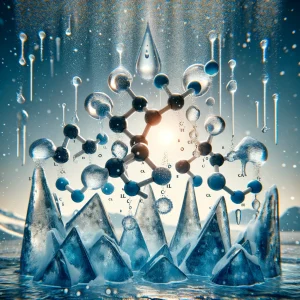Have you ever wondered why ice cubes float in your drink? Unlike most things that get smaller when they freeze, water expands. Let’s dive into this cool mystery.
Water’s Unique Molecular Dance
Imagine water molecules as dancers. When warm, they move freely, bumping into each other. As the water cools, these dancers slow down, holding hands in a special pattern. This pattern, formed by hydrogen bonds, actually takes up more space than when they were freely moving.
The Magic of Hydrogen Bonds
Think of hydrogen bonds as invisible hands holding water molecules together. In ice, these hands arrange the molecules in a spacious lattice. This unique arrangement is less dense than liquid water, meaning ice takes up more room. It’s like spreading out at a picnic to take up more space.
Why Ice Floats
Because ice is less dense than water, it floats. This is why icebergs can bob in the ocean, and your ice cubes don’t sink in a glass of lemonade. This floating trick is not just cool; it’s vital for aquatic life, providing insulation during cold months.
The Importance of This Anomaly
Water’s weird behavior is a lifesaver for our planet. It ensures lakes and rivers freeze from the top down, not the bottom up. This creates an insulating layer of ice, allowing fish and other creatures to survive in the liquid water below during winter.
Conclusion
Water’s ability to expand when it freezes is one of nature’s fascinating quirks. It’s a reminder of how even the smallest things can have a huge impact on life on Earth. So, next time you see an ice cube floating in your drink, remember the extraordinary science behind it.
References
- Water Science School by the U.S. Geological Survey (USGS)
“The Water Molecule.” An excellent resource for understanding the basic properties of water molecules, including their behavior in different states.
Water Science School - National Snow and Ice Data Center (NSIDC)
“All About Sea Ice.” This resource explains the importance of ice density and buoyancy, offering insights into why ice floats. NSIDC – All About Sea Ice - Chemistry LibreTexts
“Water’s Hydrogen Bond Strength.” A comprehensive article that delves into the hydrogen bonding in water, explaining its significance in water’s expansion upon freezing. Chemistry LibreTexts – Water’s Hydrogen Bond Strength - Scientific American
“Why Does Hot Water Freeze Faster Than Cold?” This interesting article touches on the Mpemba effect, which is indirectly related to water’s unique properties.
Scientific American



